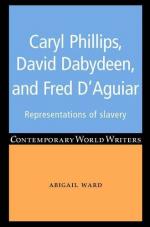|
This section contains 5,512 words (approx. 19 pages at 300 words per page) |

|
SOURCE: "Historical Fiction and Fictional History: Caryl Phillips's Cambridge," in Journal of Commonwealth Literature, Vol. XXIX, No. 2, 1993, p. 34-47.
In the following essay, O'Callaghan treats the intertextual aspects of Cambridge by examining the novel's relation to slave narratives and travel journals or diaries.
Post-modernism maintains that everything is fiction. Post-modernists say that there is no such thing as reality, only versions of reality. History is fiction, science is fiction, psychology is fiction.
So what about fiction itself? What is it supposed to do now? Plot and character are done for. If there is nothing to reveal but fiction, then fiction, some writers believe, can't tell us about anything but itself. So they give us metafiction: self-conscious fiction which draws attention to the fact that it's fiction. It's no longer enough for the conjurer to perform the trick without declaring that it is a trick.
Despite the rather peevish...
|
This section contains 5,512 words (approx. 19 pages at 300 words per page) |

|


